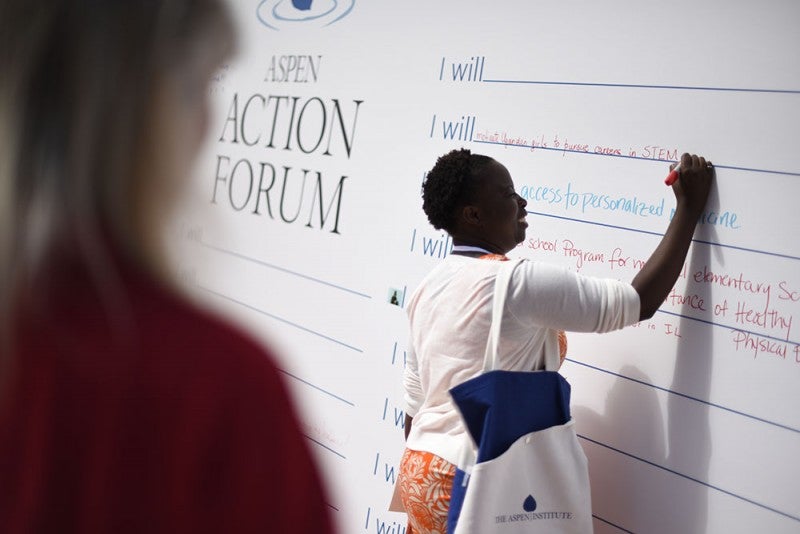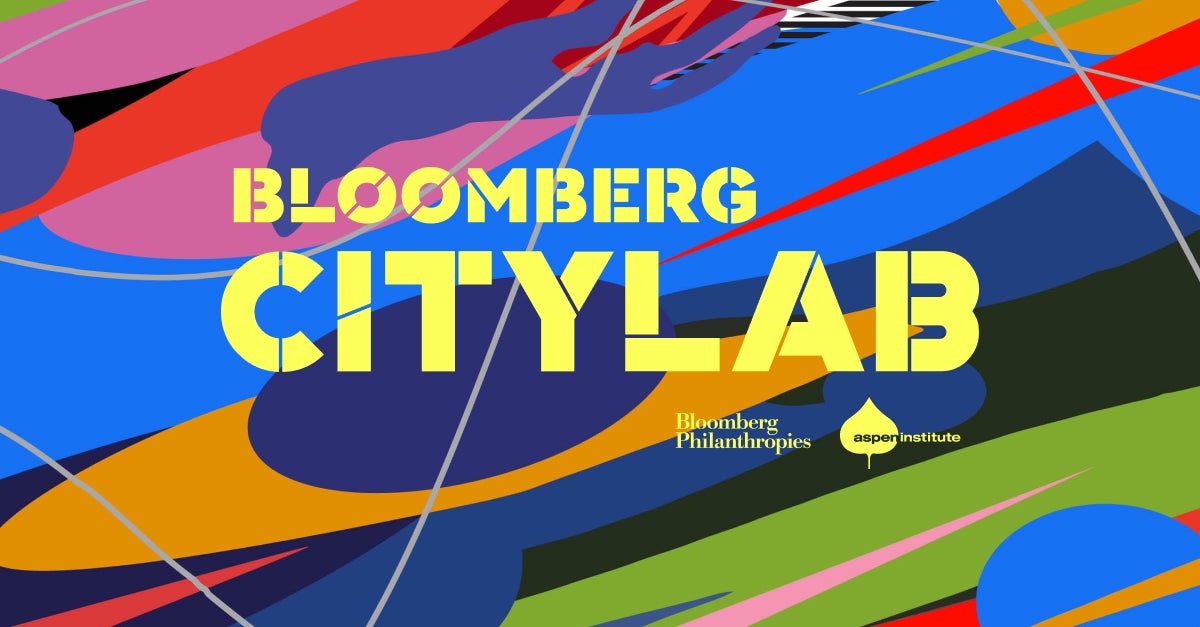
A 2014 Aspen Action Forum participant writes her Action Pledge on the Pledge Wall.
Timed for the kickoff of the recent 2014 Aspen Action Forum, Aspen Institute Fellows took to The Huffington Post-Aspen Institute channel and LinkedIn to discuss some of the major themes they explored at the Forum, such as disruption and innovation. Read below for summaries of each piece and links to read them in full.
On The Huffington Post-Aspen Institute Channel:
 Fighting Poverty Requires Unorthodox Business Practices
Fighting Poverty Requires Unorthodox Business Practices
By Bill Bynum, Henry Crown Fellow and 2013 McNulty Prize Winner
CEO, Hope Enterprise Corporation/Hope Credit Union
The biggest problem with bringing business values to the work of expanding opportunity for people disadvantaged by birth, geography or both is that no one in the business world has figured out how to value incremental improvements in social welfare in bottom-line calculations. To read the post, click here.
 Monopolies Don’t Build Democracies, People Do
Monopolies Don’t Build Democracies, People Do
By Preston Smith, Pahara-Aspen Education Fellow
President and CEO, Rocketship Education
Being poor doesn’t mean students can’t achieve. It’s the organization of our public schools itself that impedes our ability to close the achievement gap. It’s not that our public school system is big (it is!). Instead, it’s that our public school systems act like classic monopolies, controlling the “means of production” of the education system. To read the post, click here.
By Aimee Christensen, Catto Fellow
Founder and CEO, Christensen Global Strategies, LLC
This was the question at the heart of a panel discussion at the Aspen Institute’s Action Forum and one that I am often asked. My answer is twofold, first, no, and second, it better not be — for humanity’s sake. To read the post click here.
By Tamsin Smith, Henry Crown Fellow
President, SlipStreamStrategy
Art has a way of sneaking up on us, getting under the skin and stripping off the confusion, cowardice and fear that holds us back from our most authentic actions. The artist’s approach takes many forms from stealthy to direct. To read the post, click here.
 We Must Relentlessly Fight For Education Reform
We Must Relentlessly Fight For Education Reform
By Jean-Claude Brizard, Pahara-Aspen Education Fellow
President, UpSpring Education Group
Over my 28 years living inside urban school systems, I have come to understand and believe that there are two things that we must do and/or keep in mind: respect the complexity of this challenge and relentlessly execute against clear goals. To read the post, click here.
 It’s Time for an Inclusion Revolution
It’s Time for an Inclusion Revolution
By Maya Rockeymoore, Henry Crown Fellow
Founder and President of Global Policy Solutions, the Center for Global Policy Solutions, and GlobalPolicy.tv
From voter suppression laws being passed in the light of day in state houses around the country and the political assault on women’s reproductive rights to the racial wealth gap, there are disturbing signs that our nation’s baby steps towards political, social and economic inclusion could be stalling. To read the post, click here.
On LinkedIn:
 What ‘Disruptive Leadership’ Really Means
What ‘Disruptive Leadership’ Really Means
By: Calvin Chin, China Fellowship Program
Co-Founder, Transist Impact Lab
The theme for this year’s Aspen Action Forum, my first, is disruptive leadership. Where markets fail or where the established, received norms don’t deliver the intended results to society, disruptive leadership is the best alternative to resignation to the way things have always been or to incrementalism which brings change too slowly to those most in need. However, disruptive leadership brings with it uncertainty. To read the post, click here.
 Setting Public Goals: Why It’s Important
Setting Public Goals: Why It’s Important
By: Jigar Shah, Catto Fellowship Program
Chief Executive Officer, Jigar Shah Consulting, and author of Creating Climate Wealth: Unlocking the Impact Economy
In 2010, I was selected as a Catto Fellow. The program is within the Aspen Institute, and in my case, drew 21 people that are demonstrated leaders on the environment. Part of the Aspen Fellowship program is running a “project” to solve a problem that is important to you leveraging the value of your connections within the Aspen network. To read the post, click here.
 Is Green Investing Dead?
Is Green Investing Dead? Disrupt Thyself
Disrupt Thyself